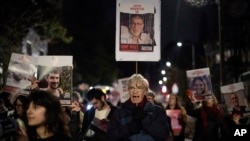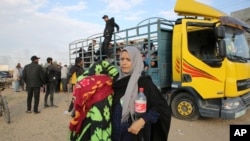Israeli Prime Minister Benjamin Netanyahu vowed again Wednesday to attack Hamas militants in the southern Gaza city of Rafah, even as he pulled Israel out of cease-fire talks in Cairo because he said Hamas had not changed what he described as “ludicrous demands” to halt the fighting.
The Israeli leader gave no indication when he might order his forces to attack Rafah. He said that hundreds of thousands of civilians now crammed into the region near the Egyptian border would first be allowed to vacate the area, although he gave no indication where they would go.
Netanyahu is under growing pressure from world leaders to not attack Rafah, but he said on his account on the messaging app Telegram, "We will fight until complete victory, and this includes a powerful action in Rafah as well, after we allow the civilian population to leave the battle zones."
Earlier, Netanyahu’s office said Hamas had presented no new offer in the Cairo talks to stop the four-month war and release more of the 100 or so hostages the militants are believed to be holding in Gaza. Hamas has been demanding that Israel withdraw all its troops from Gaza and allow the militants to continue to rule the territory along the Mediterranean Sea. Netanyahu has called for an “absolute victory” for the Jewish state.
"A change in Hamas' positions will make it possible to move forward in the negotiations," Netanyahu’s office said.
Relatives of Israeli hostages held by Hamas said it was a scandalous decision by Israel to not send negotiators to the next session of the Cairo talks.
The move "amounts to a death sentence" for the remaining hostages in Hamas' tunnels, the group said, in a sign of growing domestic dissent in Israel about the war.
The Israeli military says it wants to attack four battalions of Islamist militants holed up in Rafah hideouts.
"We are now counting down the days before Israel sends in tanks. We hope they don't, but who can prevent them?" Said Jaber, a Gaza businessman who is sheltering in Rafah with his family, told Reuters via a chat app.
Richard Peeperkorn, the World Health Organization representative for Gaza and the West Bank, said an assault on Rafah would be "an unfathomable catastrophe ... and would even further expand the humanitarian disaster beyond imagination."
French President Emmanuel Macron expressed similar concerns in a phone call with Netanyahu on Wednesday, days after U.S. President Joe Biden also voiced his opposition to a Rafah attack.
German Foreign Minister Annalena Baerbock said before talks with Netanyahu that people in Rafah with nowhere to go "cannot simply vanish into thin air."
At least 28,576 Palestinians have been killed, including 103 in the past day, and 68,291 have been wounded in Israeli strikes on Gaza since October 7, according to the health ministry in Gaza.
The war started then with the shock Hamas attack on Israel that killed 1,200 and led to the capture about 240 hostages, 100 of whom were released during a weeklong cease-fire.
A group of family members of people taken hostage by Hamas militants in the October attack on Israel is asking prosecutors at the International Criminal Court to bring charges against Hamas leaders.
The Hostages and Missing Families Forum said its visit Wednesday to the court in The Hague would advocate for charges that “encompass taking hostages, enforced disappearance, crimes of sexual violence, torture and more severe allegations.”
Israel’s military reported new airstrikes Wednesday and ground operations in central and southern Gaza, including in the Khan Younis area that has been a focus in recent weeks.
International leaders have pleaded with Israel to hold off on a ground attack on the city of Rafah, nine kilometers south of Khan Younis, where many Palestinians have sought refuge from the war.
U.N. humanitarian chief Volker Turk warned that in Rafah “some 1.5 million Palestinians are packed against the Egyptian border with nowhere further to flee.”
U.N. Secretary-General Antonio Guterres told reporters Tuesday, "My sincere hope is that the negotiations for the release of the hostages and some form of cessation of hostilities to be successful, to avoid an all-out offensive over Rafah, where the core of the humanitarian system is located. And that would have devastating consequences."
As it is, Guterres said, "there is a breakdown in public order" that is limiting delivery of humanitarian aid to displaced Palestinians, and he blamed Israel.
Some information for this story came from The Associated Press, Agence France-Presse and Reuters.






